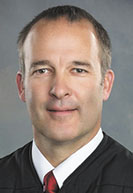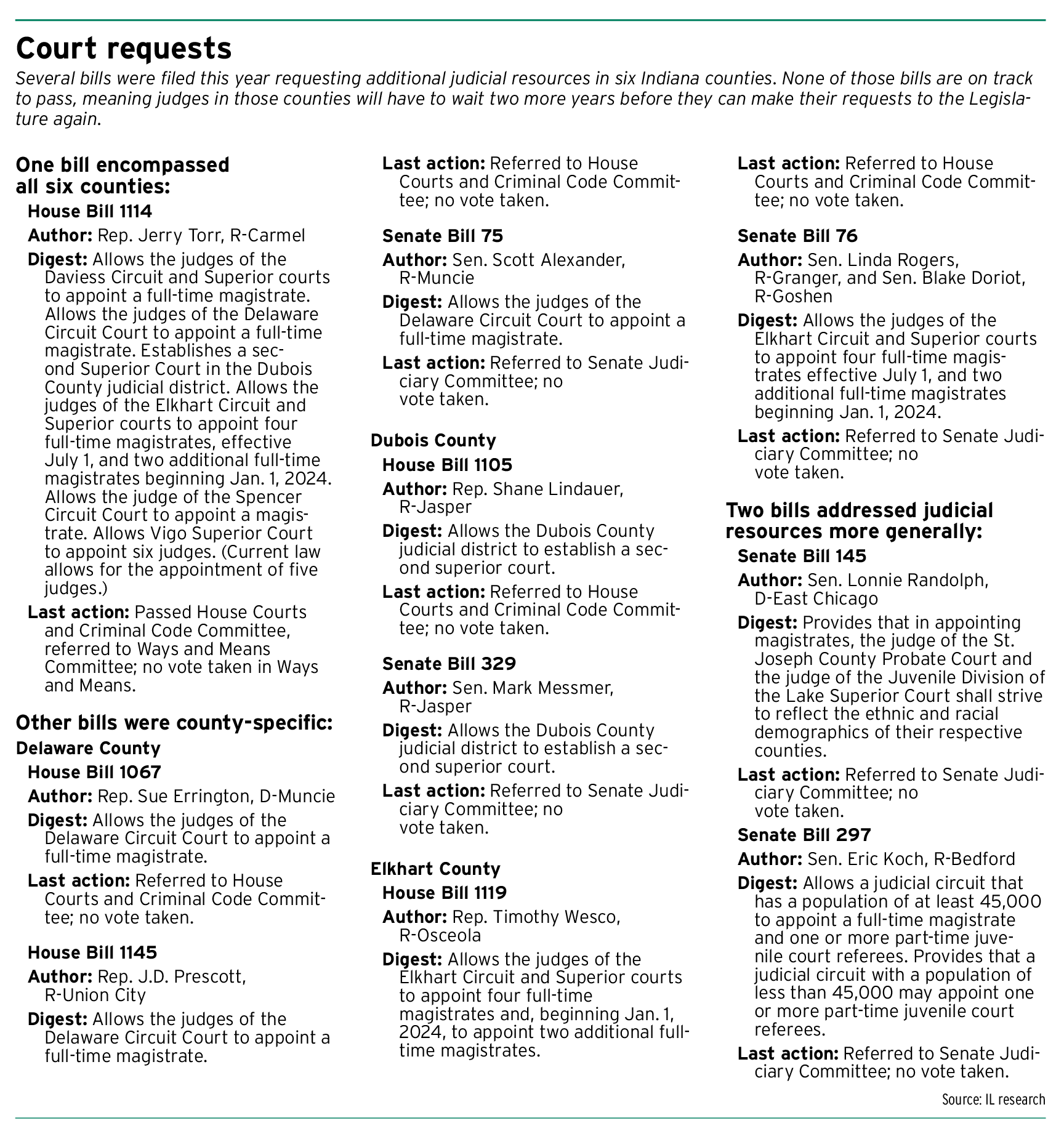Subscriber Benefit
As a subscriber you can listen to articles at work, in the car, or while you work out. Subscribe NowAs caseloads continue to grow, Hoosier judges are increasingly feeling the pressure of trying to move their cases quickly, but also justly.
To help accomplish that goal, a handful of counties asked the Indiana Legislature last summer for more magistrate judges, full-time judges or entirely new courts to bolster their judicial resources.
Some county representatives traveled to Indianapolis to explain their need and request legislation creating new judicial resources during the 2023 session of the Indiana General Assembly, which is ongoing. However, the Interim Study Committee on Courts and the Judiciary failed to reach a procedural quorum last fall, meaning it could not officially recommend to the full General Assembly that the counties receive the additional resources they were asking for.
The counties’ requests were still presented to lawmakers when they convened in January, but without the study committee’s official approval, they were essentially dead on arrival.
That means all 10 bills requesting judicial resources for six Indiana counties failed to make it out of committee. Now, judges in those counties will have to wait another two years, when the state makes its next biennial budget, to make their requests again.
Walking a tightrope
Via House Bill 1114, six counties requested judicial resources. That included:
• A full-time magistrate judge in Daviess County.
• A full-time magistrate judge in Delaware County.
• A second superior court in Dubois County.
• Four full-time magistrate judges in Elkhart County effective July 1, then two additional magistrates effective Jan. 1, 2024.
• A full-time magistrate judge for Spencer County.
• One additional judge for Vigo County.

“You have to put together your packet that includes certain things, including a survey of the of the bar. It just took a lot of time, a lot of effort. The court staff really worked hard on that — I thought we’d get put together good package, just like all the other counties that presented it to the interim study committee,” Dubois Circuit Judge Nathan Verkamp said.
In addition to HB 1114, the requests of three counties were addressed through county-specific bills.
That included Dubois County, which requested its second superior court through House Bill 1105 and Senate Bill 329. The county currently has one circuit and one superior court for about 43,549 people, including the city of Jasper.
“We’re the largest county in the state of Indiana by population that’s only served by our two judicial officers, so access to traditional resources is pretty precious right now,” Verkamp said. “We set a lot of hearings, we even go through our lunch hour, after hours, to make sure that hearings are heard in a timely manner. We really needed that additional judicial resource. So, it’s unfortunate.”
Verkamp said his county hadn’t made requests for judicial resources since 1982, when the superior court was created.
According to Indiana’s 2022 Weighted Caseload Measures report, Dubois County ranked fourth of the state’s 92 counties in terms of severity judicial need, with the county having 2.20 judges but need 2.48.
Verkamp said while the county is disappointed its request didn’t even make it out of committee, it will try again and in hopes for a different outcome.
Like Dubois County, Daviess County has only one circuit court judge and one superior court judge. Its population as of 2021 was 33,397, with the county seat in Washington.
“There’s just more strain on the courts and staff than there would be had that being granted,” Daviess Superior Judge Dean Sobecki said. “It just means that we continue to work harder and do the best we can to work on the caseload that we have with the two judicial officers that we have.”
Daviess was 55th in the Weighted Caseload Report, needing 1.99 judges and having 2.40.
Sobecki said he doesn’t anticipate the county’s caseload decreasing, so it will ask for its additional magistrate judge again in 2025.
“This summer, everybody that we had presented to seemed to be enthusiastic, seemed to indicate that there wasn’t any problem — until there was,” he said. “I understand it’s a process and so I’m disappointed that we didn’t get it. We think it’s a position that would aid the citizens of Daviess County by allowing us to have more efficient judicial services available.”
Legislative holdup

Rep. Jerry Torr, R-Carmel, authored HB 1114, which initially passed out of the House Courts and Criminal Code Committee. However, the bill was then sent to the Ways and Means Committee, where it died without a hearing.
“I was disappointed there wasn’t a quorum (at the summer study committee) but it wouldn’t have made much of a difference,” Torr said. He said even if the study committee had voted on the requests, committee chairs knew the bills wouldn’t make it out of Ways and Means or the Senate Appropriations Committee, so they weren’t voted on.
But Torr pointed to the Weighted Caseload Report and said judges could share resources with a neighboring county if needed.
“There may be a need in one county, but a judge only has 50% caseload in another county,” he said.
The interim study committee looks at the severity-of-need report when considering judicial requests. It also considers a county’s population.
Vigo County was the highest on the severity list, taking the third spot. The county, which includes Terre Haute, has 7.89 judges and needs 9.34. Its population in 2021 was 105,994.

Elkhart County was sixth, having 11.32 judges and needing 12.53. Its 2021 population was 206,921.
Spencer County was No. 9 on the list, with a need for 1.41 judges compared to the actual 1.30 judges. It had a population of 19,798 in 2021.
Finally, Delaware County ranked 40th out of Indiana’s 92 counties, needing 6.45 judges and having 7.19. Its 2021 population was 111,871.
Echoing Torr, Sen. Scott Alexander, R-Muncie, said the denial of the judicial requests relates to the allocation of funds for court staff and judges. He said it can cost around $180,000 for one new magistrate position.Alexander authored Senate Bill 75, which would have allowed the Delaware Circuit Court to appoint a full-time magistrate judge.
“We haven’t had this many requests before,” he said.•
Please enable JavaScript to view this content.

